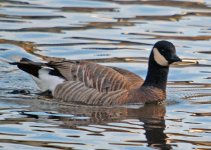This bird was on a lake in a small town in inland Normandy last week. It was one of a pair. There were no other geese of any kind. It was slightly bigger than the Mallards. On looking it up and judging by size, it appears to be a Cackling Goose, probably species Branta hutchinsii minima. It was definitely much smaller than a Canada Goose.
As this is a North American species, my question is whether it is likely to be a wild bird? There seem to have been a few recorded here in southern UK recently.
Thanks
Pat
As this is a North American species, my question is whether it is likely to be a wild bird? There seem to have been a few recorded here in southern UK recently.
Thanks
Pat





